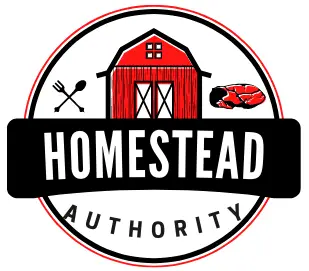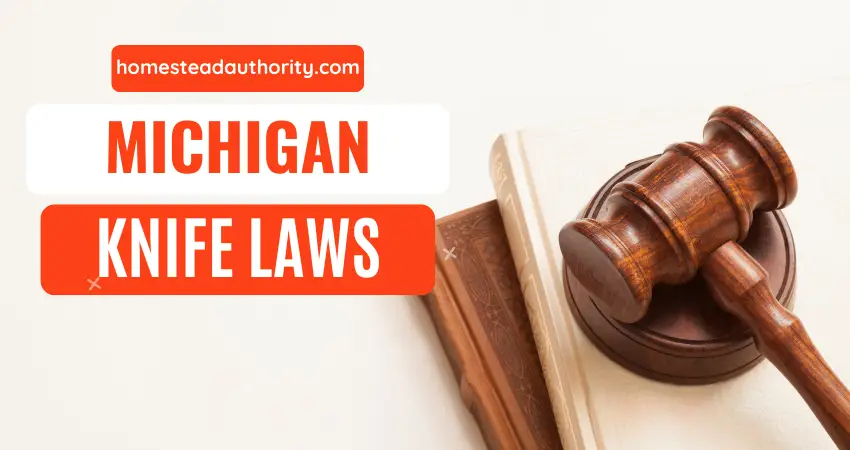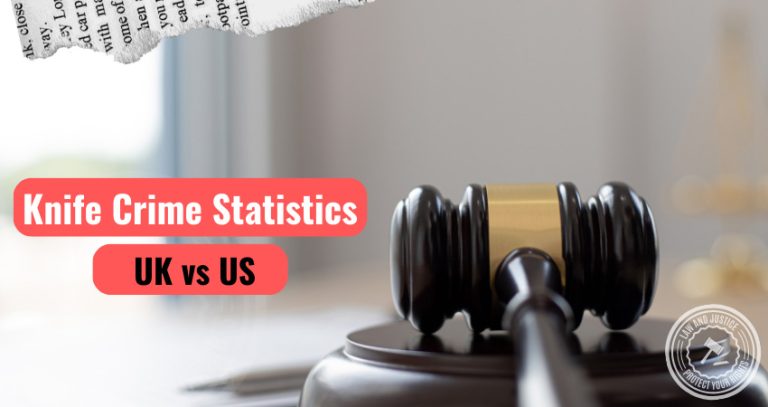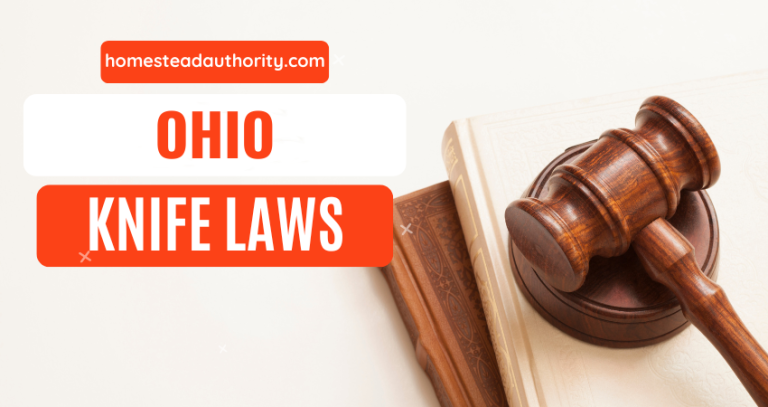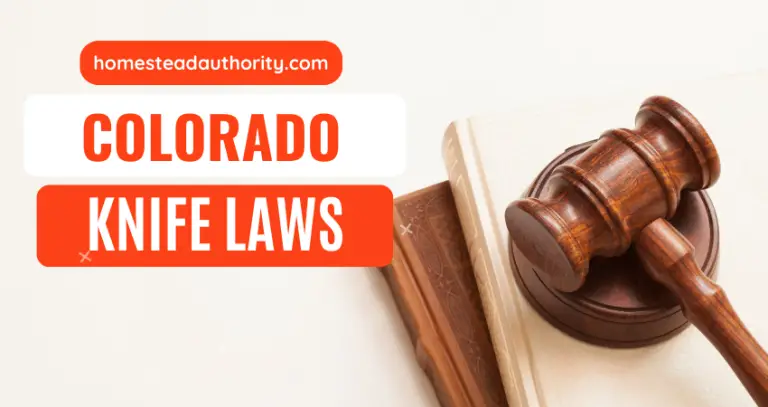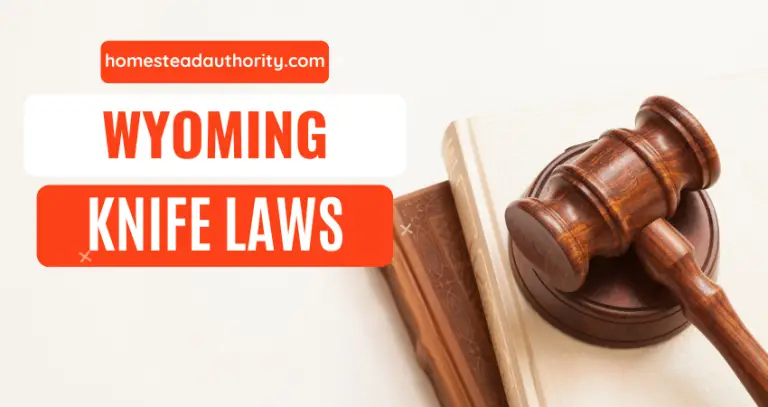Understanding Kansas’s Knife Laws: What You Need to Know
Knives are always great to have around if you’re preparing food yourself, and they’re undoubtedly one of the most useful tools in the kitchen.
But when you need to carry knives outside, there are some knife laws you need to follow.
Not following these can lead the fines or confinement in the USA.
This makes a lot of people wonder about the Kansas knife laws. Thankfully, Kansas isn’t very strict with its knife laws, and you can carry most knives concealed outside legally.
There are no restrictions on the size, too.
However, there are many more details to cover than just that.
So today, we’ll be covering all about the knife laws in Kansas, illegality in specific cases, exceptions in the knife law, punishments, and more. Let’s get straight into it.
Quick Legal Facts
- Statewide Preemption: Yes.
- Concealed Carry: Yes.
- Restricted Knives: There are no specifically restricted knives in Kansas.
- Schools: Dangerous weapons such as knives aren’t allowed on school grounds or other areas such as government buildings.
- Critical Dimensions: None noted.
List Of Relevant Laws
21-6301: Criminal use of weapons
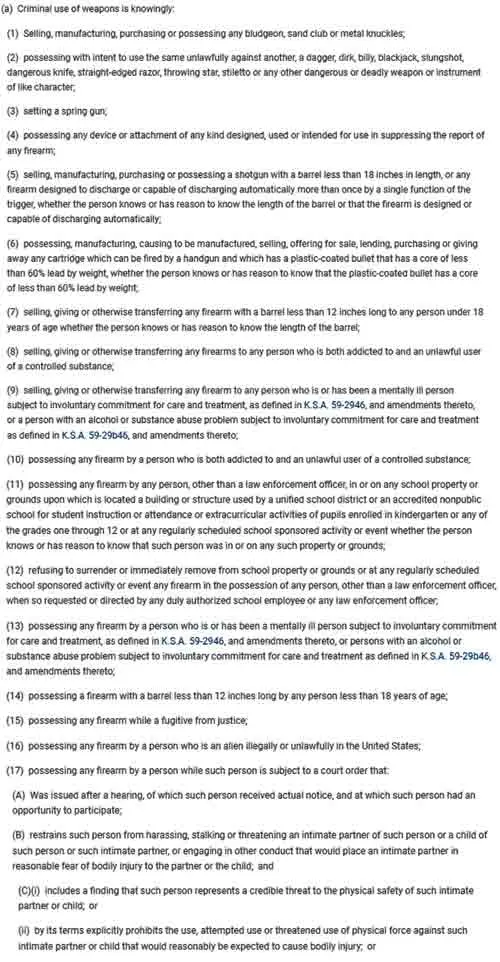
21-6302: Criminally carrying other dangerous weapons
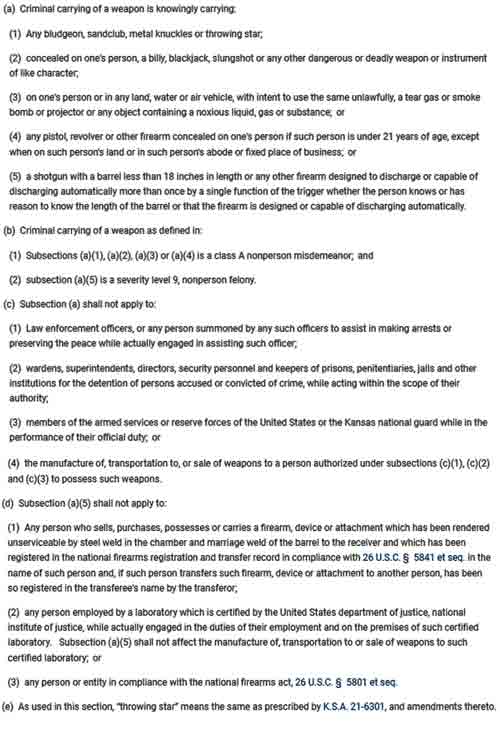
21-6304: Criminal possession of knives
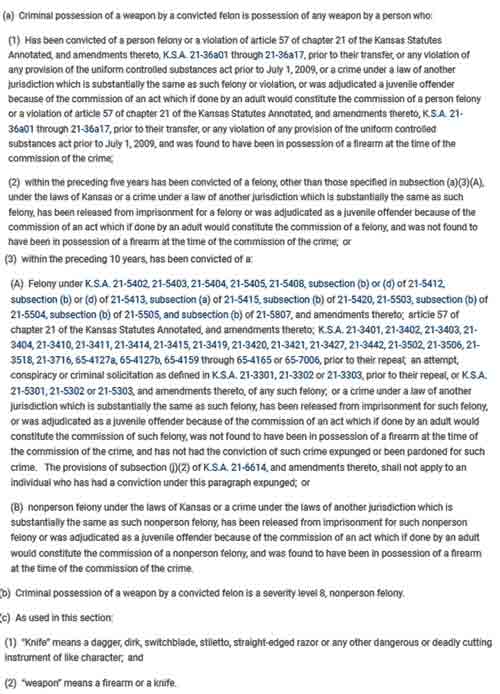
12-16,134: Knives making components and knife regulations or limitations from municipalities

Kansas Knife Laws
Normally, we’d start by listing the illegal knives in Kansas.
But since Kansas doesn’t have any restrictions on specific knives or their knife length, there aren’t any specifically illegal knives you can’t carry outside.
However, dangerous weapons such as brass knuckles, metal knuckles, throwing stars, and blackjack knives aren’t allowed. These don’t really count as knives, though.
So overall, as long as the knife is made from a regular shop and not meant for criminal activity, you’re good to go.
But this isn’t all, as there are illegalities in specific cases or areas.
We list all of them in detail here below —
Illegality In Certain Areas
As you can probably guess, knives are completely illegal in areas like schools, juvenile correction facilities, and jails.
Any deadly weapon without authority is banned here, including firearms and knives. Even the smallest pocket knives are banned, and you can only bring them with a permit.
Make sure to be careful with knives in places like police stations and airports, too, since they’re generally very strict with their security.
You won’t have to worry about this too much as long as you’re not carrying it concealed or threatening someone with it.
Illegality Based On Concealed Or Open Knives
There aren’t any laws regarding whether the knife is concealed or not in Kansas.
This means that you can carry just about any knife you want outside concealed as long as it’s not in a restricted area.
It applies to all ages, so even minors can carry knives legally concealed without any issues as long as it’s not in a school.
Keep in mind that even pocket knives are illegal to carry to schools.
Illegality Of Carrying, Possession, Selling, Manufacturing, Importing, & Trading
As long as you’re an adult, there isn’t any illegality in carrying, selling, possessing, manufacturing, importing, or trading knives as long as it’s legal in both countries.
You can’t manufacture or import knives as a minor, though, and you can’t trade them for something illegal.
This will come with a very heavy fine if you do so and may even result in confinement in some cases.
Illegality To The Degree Of Significance Such As Impact On Interstate Commerce
Knowingly distributing or transporting knives for interstate commerce is legal through world borders as long as it’s not a dangerous weapon or firearm.
Illegality For Minors
In Kansas, there are no laws regarding the age of the carrier of a knife.
So you can carry just about any knife concealed in public without any issues, except for brass knuckles.
So if you have a driver’s license, you can even carry a knife in car in Kansas.
Illegality Based On Length Of Knife
If you’re wondering “what size knife length is legal to carry in Kansas,” there is none regarding the length.
So you can carry any type of knife of any length. Even an 11-inch butcher’s knife is legal to own and possess in public without a permit.
Illegality In Local Governments
Unlike many other areas of the US, Kansas has statewide preemption. This means that local governments or municipalities can’t change the knife laws in any way.
According to law, municipalities can’t pass any rule or tax regarding carrying, possessing, transferring, transporting, gifting, manufacturing, or selling knives.
Penalties For Carrying Knives Illegally In Kansas
Kansas isn’t very strict with its knife laws. As long as you don’t carry the knife in a restricted area such as school, you’re mostly fine.
But if you break the knife laws in Kansas, you can get hefty punishments and even confinement.
Most of the time, you can get a fine of $600 or more and 1 year of confinement in some cases.
If you harm someone with a knife, you can get sentenced to over 10 years of confinement as well as a fine of above $10,000
Exceptions In The Knife Law Of Kansas
Here are all the exceptions in the knife laws of Kansas —
- Law enforcement officers.
- Wardens, directors, security guards, superintendents, keepers of prisons, jails and other institutions for keeping criminals.
- Anyone in the military.
- Members of armed forces and national guards.
- Any authorized individual with a verified license.
Conclusion
Hopefully, now you have a good idea of all the Kansas knife laws. There aren’t that many laws, and you won’t have to worry about carrying it concealed, age, specifically restricted knives, or the legal knife length.
You’re safe if you don’t carry the knife to schools or other restricted areas.
However, many people neglect that even if there aren’t any restricted knives, deadly weapons such as brass and metal knuckles, blackjack weapons, and throwing stars are still illegal to carry in public.
Carrying these can lead to a heavy fine of $500 or more. With all that said, cheers!
